Rules of Prepositions with examples. Learn the use of prepositions with examples. Rules of prepositions in English and Urdu. 9 Rules of Prepositions with detailed explanation and examples. 200 Prepositions with rules and example sentences. Learn the Rules of Prepositions with example sentences. All the Rules of Prepositions with examples of each.
Download PDF at Bottom
Rule NO.1: Always use “to” after the following words.
| Accede to | مان لینا | Indebted to | ممنون |
| Accustomed to | عادی | Kind to | مہربان |
| Addicted to | عادی | Lead to | رہنمائ کرنا |
| Adhere to | چمٹے رہنا | Loyal to | وفادار |
| Adjacent to | ملحقہ | Necessary to | ضروری |
| Assent to | منظوری دینا | Obliged to | احسان مند |
| Attend to | توجہ دینا | Opposite to | کے سامنے |
| Belong to | تعلق رکھنا | Object to | اعتراض کرنا |
| Concede to | اعتراف کرنا | Prefer to | ترجیح دینا |
| Contrary to | کے برعکس | Senior to | رتبہ میں بڑا |
| Devote to | وقف کرنا | Junior to | رتبہ میں چھوٹا |
| Dedicated to | منسوب | Superior to | معیار میں اعلی |
| Eager to | مشتاق | Inferior to | معیار میں گھٹیا |
| Equal to | مساوی | Talk to | سے باتیں کرنا |
| Fatal to | مہلک | Trend to | رجحان ہونا |
| Faithful to | وفادار | True to | سچا،پکا |
| Harmful to | نقصان دہ | Introduce to | متعارف کروانا |
| Injurious to | نقصان دہ | Yield to | تسلیم کرنا |
| Invite to | دعوت دینا | Prior to | سے پہلے |
| Indifferent to | لاپرواہ | Preferable to | قابل ترجیح |
Examples
God is kind on us. (incorrect)
God is kind to us. (correct)
She belongs with a noble family. (incorrect)
She belongs to a noble family. (correct)
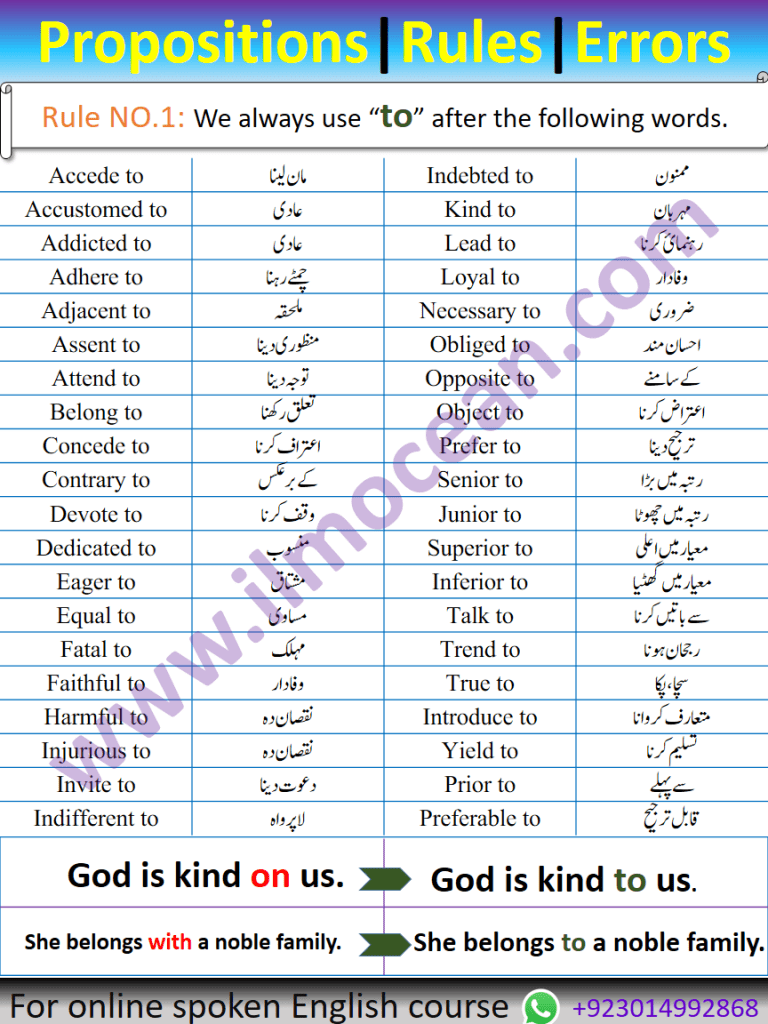
Rule NO.2: Always use “of” after the following words.
| Accuse of | الزام لگانا | Dispose of | فروخت کرنا |
| Afraid of | خائف | Dream of | خواب دیکھنا |
| Ashamed of | شرمندہ | Envious of | رشک کرنے والا |
| Approve of | منظوری دینا | Fond of | شوقین |
| Avail of | فائدہ اٹھانا | Hopeful of | ُُپُریقین |
| Aware of | باخبر رہنا | Jealous of | حاسد |
| Beware of | محتاط رہنا | Insensible of | ناسمجھ |
| Boast of | شیخی بکھارنا | Negligent of | غافل |
| Certain of | پُریقین | Proud of | مغرور |
| Confident of | پُراعتماد | Remind of | یاد دلانا |
| Consist of | مشتمل ہونا | Repent of | پچھتانا |
| Conscious of | باخبر | Sure of | پُریقین |
| Deprived of | محروم کرنا | Vain of | مغرور |
| Desirous of | خواہش مند | Worthy of | اہل |
Examples
He was afraid from a lion. (incorrect)
He was afraid of a lion. (correct)
She is worthy for this post. (incorrect)
She is worthy of this post. (correct)
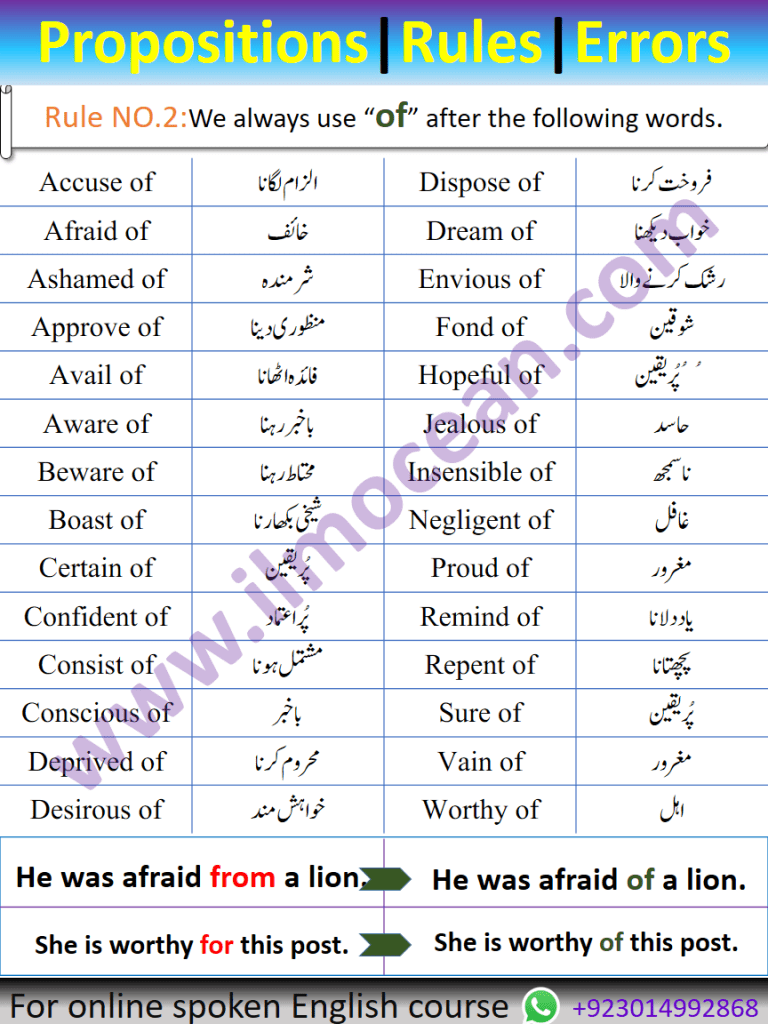
Rule NO.3: Always use “for” after the following words.
| Affection for | پیار،محبت | Desire for | خواہش کرنا |
| Apologies for | معذرت کرنا | Eligible for | اہل |
| Blame for | الزام دینا | Famous for | مشہور |
| Bound for | پابند | Long for | خواہش کرنا |
| Candidate for | امیدوار | Notorious for | بدنام |
| Care for | پرواہ | Taste for | زوق ،دلچسپی |
Examples
This train is bound to Lahore. (incorrect)
This train is bound for Lahore. (correct)
He is not eligible of this post. (incorrect)
He is not eligible for this post. (correct)
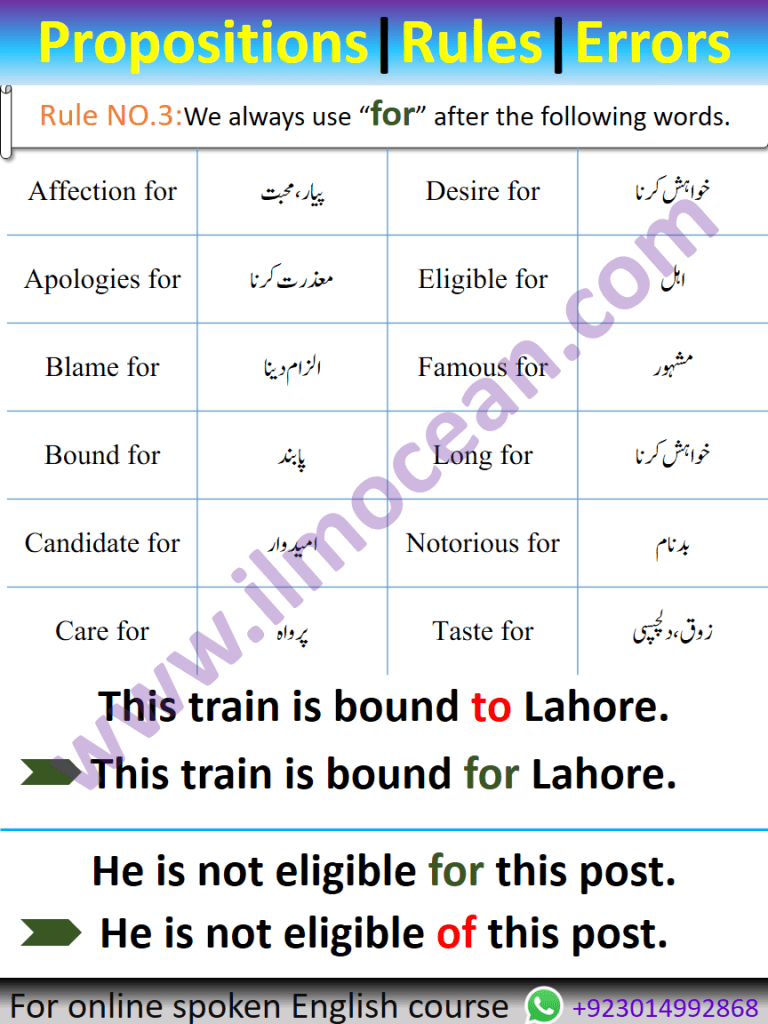
Rule NO.4: Always use “with” after the following words.
| Amuse with | لطف اندوذ ہونا | Impressed with | متاثر |
| Acquainted with | واقف،شناسا | Infested with | پُر،بھرا ہوا |
| Beat with | مارنا،پیٹنا | Pleased with | خوش |
| Busy with | مصروف | Popular with | ہردلعزیز |
| Charge with | الزام لگانا | Quarrel with | لڑنا |
| Condole with | تعزیت کرنا | Satisfied with | مطمئن |
| Comply with | تعمیل کرنا | Sympathies with | ہمدردی کرنا |
| Displeased with | ناراض | Teem with | سے بھرا ہوا |
| Interfere with | مداخلت کرنا | Trust with | حوالے کرنا |
Examples
He was charged of theft. (incorrect)
He was charged with theft. (correct)
She is busy in her work. (incorrect)
She is busy with her work. (correct)
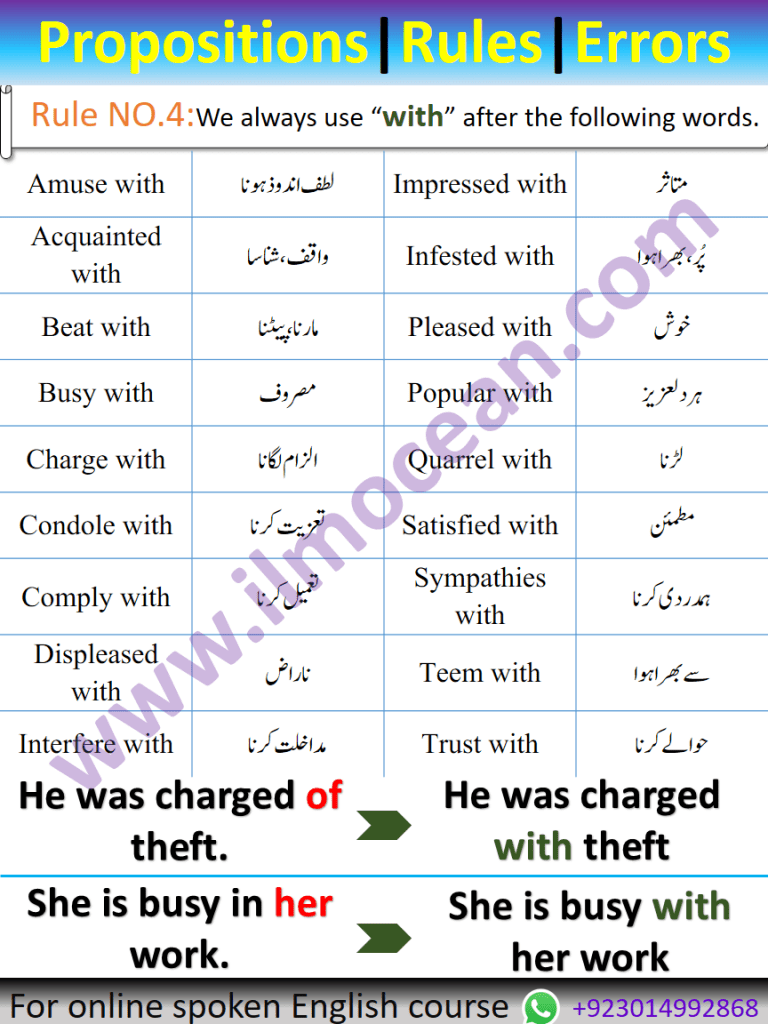
Rule NO.5: Always use “at” after the following words.
| Aim at | نشانہ باند ھنا | Glad at | خوش |
| Alarmed at | خبردار ہونا | Jeer at | منہ چڑانا |
| Amazed at | حیران | Knock at | دستک دینا |
| Annoyed at | ناراض | Laugh at | مذاق اڑانا |
| Disappointed at | مایوس | Stare at | گھورنا |
Examples
Do not laugh on the poor. (incorrect)
Do not laugh at the poor. (correct)
She was very glad on her success. (incorrect)
She was very glad at her success. (correct)
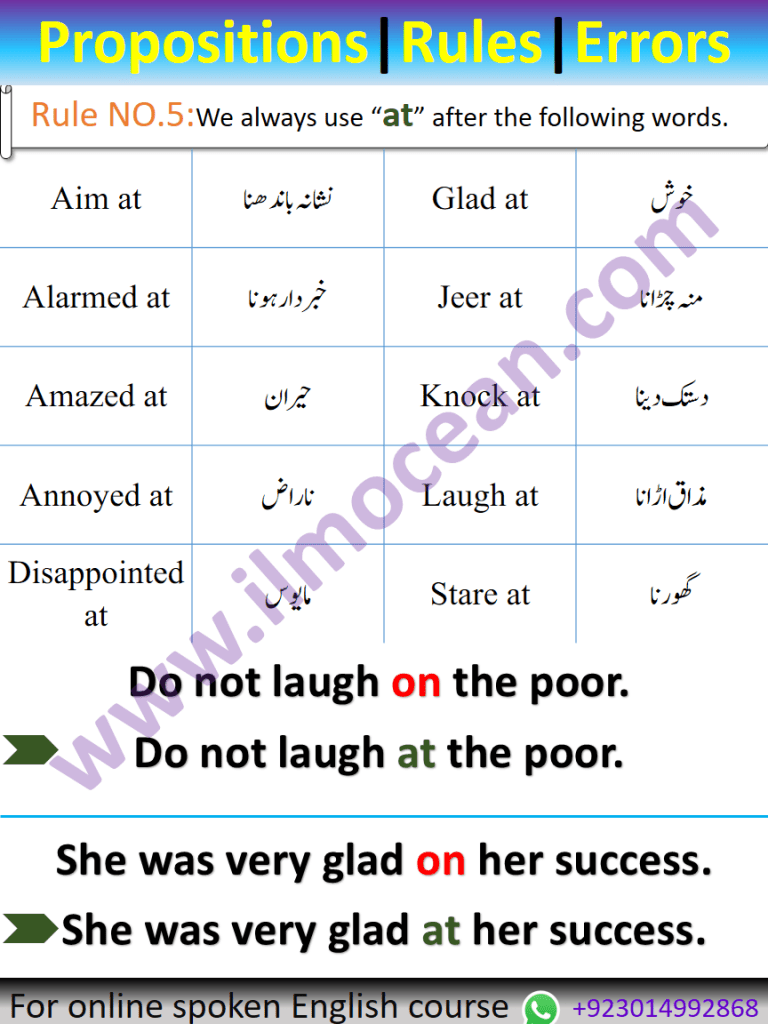
Rule NO.6: Always use “on” after the following words.
| Avenge on | بدلہ لینا | Impose on | نافذ کرنا |
| Comment on | تبصرہ کرنا | Insist on | اصرار کرنا |
| Depend on/upon | انحصار کرنا | Rely on | بھروسہ کرنا |
| Knock on | دستک دینا |
Examples
Do not depend at fair weather friends. (incorrect)
Do not depend on fair weather friends. (correct)
You should rely at your good friends. (incorrect)
You should rely on your good friends. . (correct)
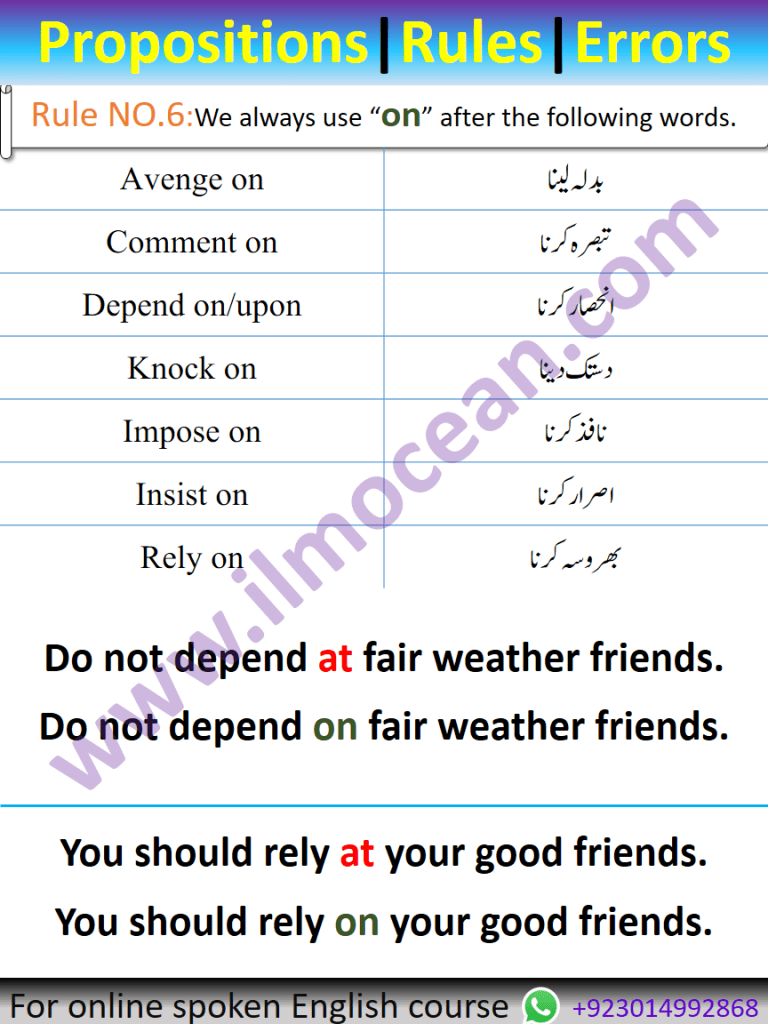
Rule NO.7: Always use “in” after the following words.
| Believe in | یقین کرنا | Lack in | کمی ہونا |
| Clothed in | ملبوس | Meddle in | مداخلت کرنا |
| Deal in | کاروبارکرنا | Persist in | ثابت قدم |
| Deficient in | کمی ہونا | Proficient in | ماہر |
| Excel in | سبقت لے جانا | Trust in | بھروسہ کرنا |
Examples
Always trust on God. (incorrect)
Always trust in God. (correct)
Please believe on me. (incorrect)
Please believe in me. (correct)

Rule NO.8: Do not use any preposition with the following verbs.
| Pass | پاس ہونا | Love | محبت کرنا |
| Meet | ملنا | Marry | شادی کرنا |
| Discuss | بحث کرنا | Reach | پہنچنا |
| Affect | اثر کرنا | Attack | حملہ کرنا |
| Know | جاننا | Resemble | مشا بہت رکھنا |
ؑؑExamples
She loves with books. (incorrect)
She loves books. (correct)
He reached at the station in time. (incorrect)
He reached the station in time. (correct)
But when “married” and “known” are used in passive voice sentences we use “to” with them.
Examples
He married to his cousin. (incorrect)
He married his cousin. (correct)
He was married with his cousin. (incorrect)
He was married to his cousin. (correct)
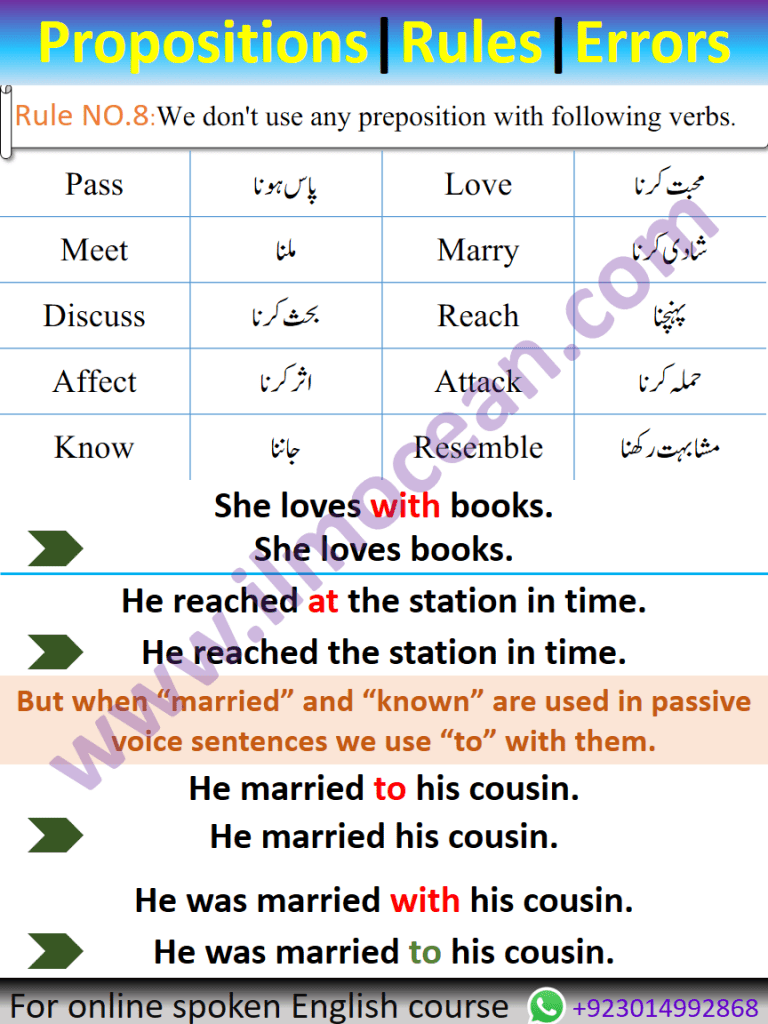
Rule NO.9: The use of preposition with the verbs in the following sentences is necessary.
Incorrect correct
| The pen is to write. | The pen is to write with. |
| The road is to go. | The road is to go by. |
| I gave him a gun to shoot. | I gave him a gun to shoot with. |
| Please get a chair to sit. | Please get a chair to sit on. |
| Whom was she talking? | Whom was she talking to? |
| What is he looking? | What is he looking at? |
| This is the story she is interested. | This is the story she is interested in. |
| The patient has been operated. | The patient has been operated upon. |
| He has a decent house to live. | He has a decent house to live in. |
| The stick to walk. | The stick to walk with. |
| The knife is to cut. | The knife is to cut with. |
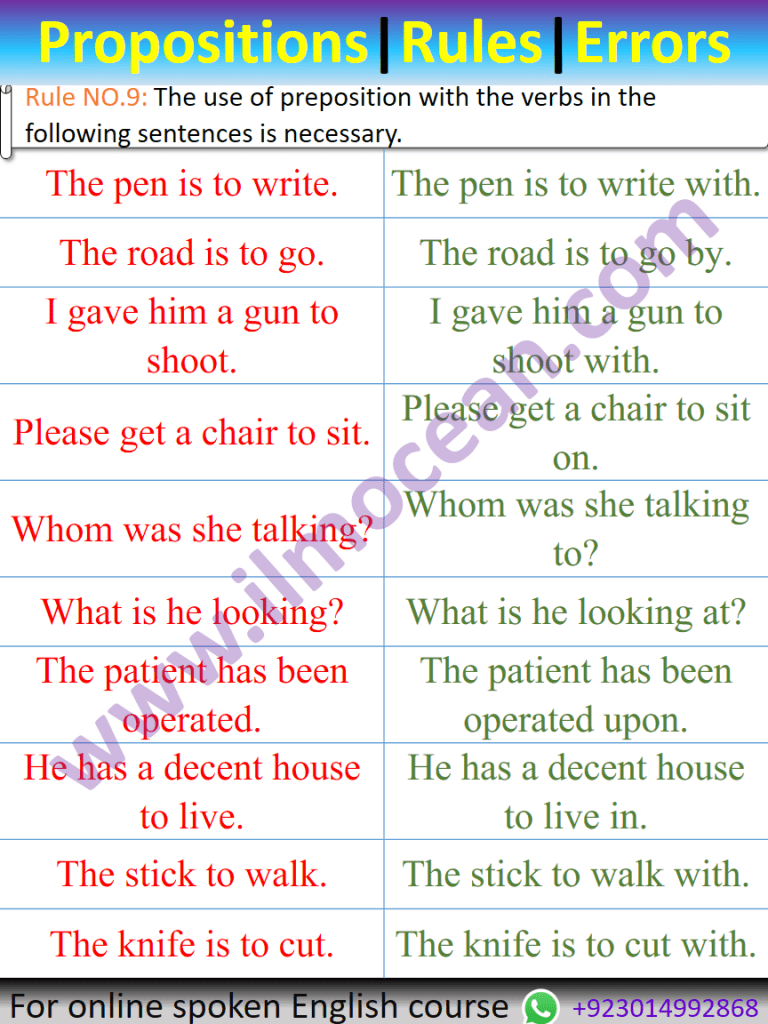
Rule NO.10: Some verbs take different prepositions according to the meaning and context.
| Abide by | پابندی کرنا | Work out | تخمینہ لگانا |
| Abstain from | پرہیز کرنا | Work up | اشتعال دلانا |
| Act upon | عمل کرنا | Quick at | کسی خوبی میں تیزہونا |
| Add to | اضافہ کرنا | Quick in | کسی کام میں تیز ہونا |
| Agree with | کسی شخص سےمتفق ہونا | Bring out | شائع کرنا |
| Agree to | کسی تجویز سےمتفق ہونا | Bring about | کا باعث بننا |
| Angry with | کسی شخص سے ناراض ہونا | Call in | طلب کرنا |
| Angry at | کسی بات پر ناراض ہونا | Call on | کسی شخص سے ملنا |
| Anxious about | کسی شخص کے لیے فکرمندہونا | Call at | کسی شخص سے کسی جگہ ملنا |
| Anxious for | کسی چیز کے لیے فکرمندہونا | Come of | تعلق رکھنا |
| Apply to | کسی سے درخواست کرنا | Come off | منعقد ہونا |
| Apply for | کسی کام کےلیے درخواست کرنا | Compare with | ایک ہی جنس کی چیزوں کامقابلہ کرنا |
| Blind of | اندھا ہونا | Compare to | مختلف جنس کی چیزوں کا مقابلہ کرنا |
| Blind to | بےخبر ہونا | Die of | بیماری سے مرنا |
| Break down | خراب ہونا | Die with | بھوک سے مرنا |
| Break in to | نقب لگانا | Die from | حادثہ سےمرنا |
| Break out | اچانک شروع ہونا | Die by | ہتھیارسےمرنا |
| Break with | سے تعلق توڑلینا | Differ from | مختلف ہونا |
| Bring up | پرورش کرنا | Differ with | اختلاف کرنا |
| Familiar to | کسی شخص سے واقف | Engage in | مصروف ہونا |
| Familiar with | کسی چیز سے واقف | Engage to | منگنی ہونا |
| Glance at | نظر ڈالنا | Fall in | قطار بنانا |
| Guard against | بچانا | Fall out | لڑناجھگڑنا |
| Give up | ترک کرنا | Fall off | سے گرنا |
| Give away | تقسیم کرنا | Feel for | احساس ہونا |
| Good at | اچھا ہونا | Forgive for | معاف کرنا |
| Hand over | حوالے کرنا | See off | خداحافظ کہنا |
| Hanker after | آرزو کرنا | Set up | قائم کرنا |
| Hostile to | موافق نہ ہونا | Set in | موسم وغیرہ کاشروع ہونا |
| Look after | دیکھ بھال کرنا | Stand by | ساتھ دینا |
| Look for | تلاش کرنا | Suffer from | مبتلا ہونا |
| Look up | معنی تلاش کرنا | Take after | مشابہ ہونا |
| Part with | کسی چیز سے جدا ہونا | Take off | اتارنا |
| Part from | کسی شخص سے جدا ہونا | Tire of | کسی شخص یاچیزسے تنگ آجانا |
| Pray to | کسی سے دعا کرنا | Tire with | تھک جانا |
| Pray for | کسی کے لیے دعا کرنا | Wait for | انتظار کرنا |
| Put by | بچت کرنا | Trust in | بھروسہ کرنا |
| Put on | پہننا | Weak in | کمزور |
| Put off | ملتوی کرنا | Put out | بجھانا |
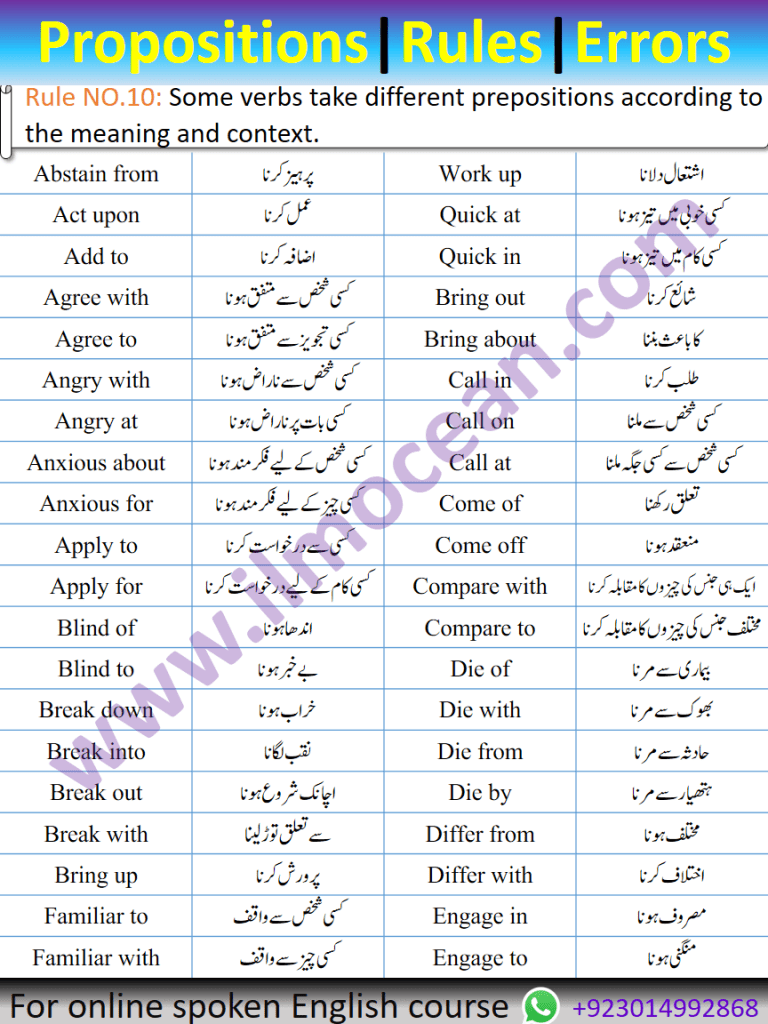
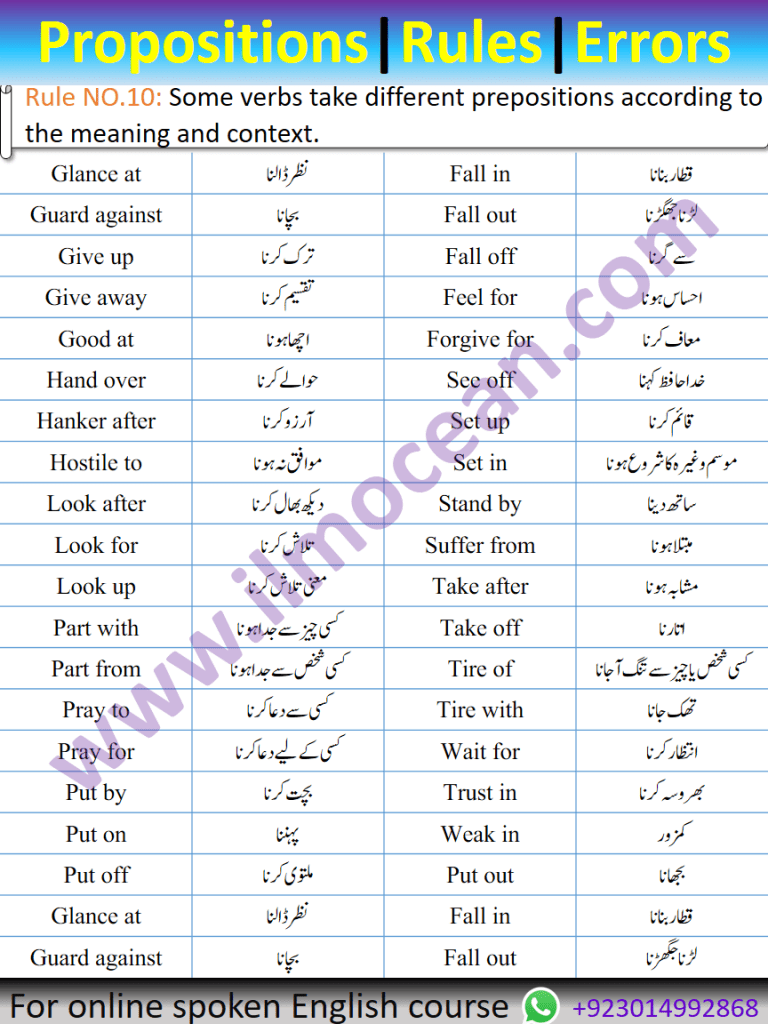
Rule NO.11: Some important rules in use of preposition.
1) We use “on” with date and day.
- a) He met me on Monday.
- b) He met me on 14th
2) We use “in” with month name and year.
- a) He met me in August.
- b) He met me in 2000
3) We use “at” with time.
- a) He arrived at 5p.m.
4) We use “in” before name of seasons.
- a) Flowers blossom in the spring.
5) We use “in” after lecturer and use “of” after professor.
- a) His elder brother is a lecturer in English.
- b) His father is a professor of English.
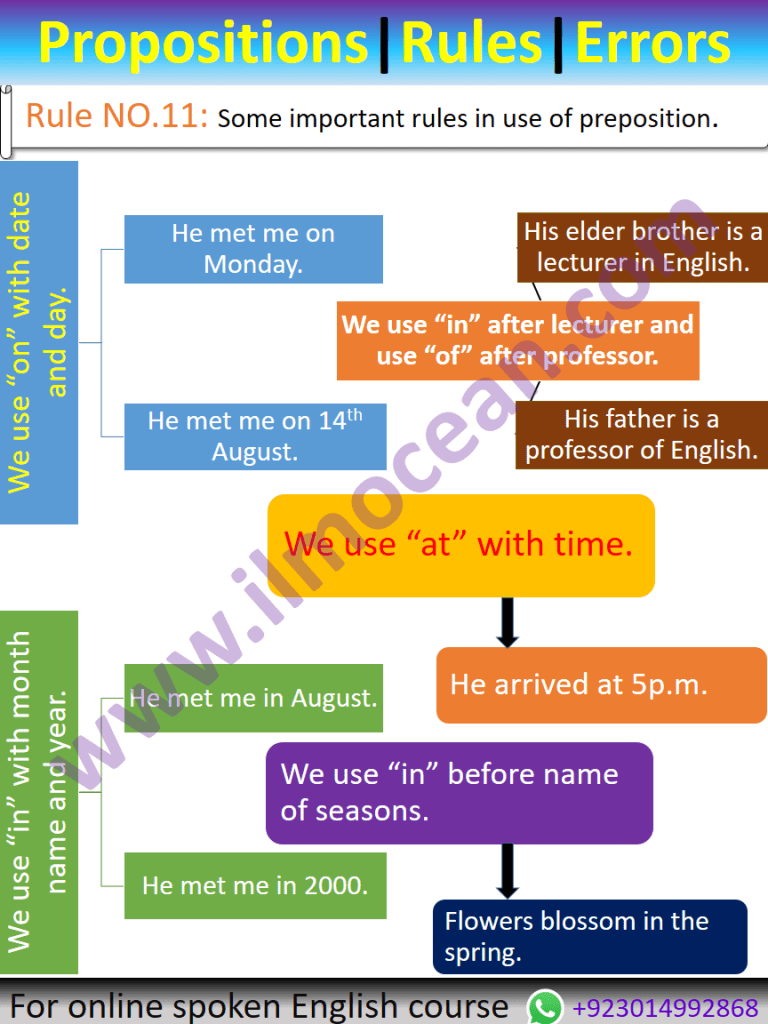
Download PDF File Here

